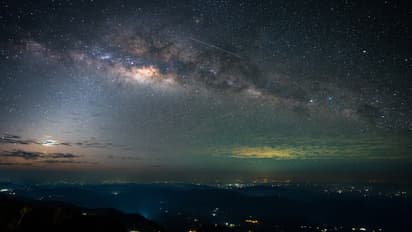Are we alone in the Universe? New 'formula for life' calculator reveals chances of aliens existing

Synopsis
In a groundbreaking revelation, researchers have redefined the odds of intelligent life existing within our universe, delivering a potentially sobering insight for those captivated by the prospect of extraterrestrial civilizations.
In a groundbreaking revelation, researchers have redefined the odds of intelligent life existing within our universe, delivering a potentially sobering insight for those captivated by the prospect of extraterrestrial civilizations. The research team, led by scientists from the University of Edinburgh and the University of Geneva, has formulated an advanced model—dubbed the "formula for life"—that might be the most exhaustive approach to date for exploring the potential of life beyond Earth.
According to their calculations, the likelihood of intelligent life existing in universes beyond our galaxy stands at only 27%, a figure far from the optimistic belief held by 65% of American adults who are convinced of alien life on distant planets. For our own Milky Way, the odds are even lower, barely reaching 23%.
According to Daily Mail, the research, published in the Monthly Notices of the Royal Astronomical Society, hints that while the processes of star formation and the evolution of large planets might lay the groundwork for future intelligent life, the actual chances remain elusive. The scientists employed an adaptation of the Drake Equation, a theoretical model from 1960, to guide their calculations. Unlike traditional applications, however, the team focused on estimating the likelihood of intelligent life rather than its probable numbers.
A unique aspect of their model is its consideration of dark energy—a mysterious force making up over two-thirds of the universe and propelling its expansion. This energy influences the formation of galaxies and star clusters that might one day host alien civilizations, provided they remain stable over billions of years.
Dr. Daniele Sorini, lead researcher from Durham University’s Institute for Computational Cosmology, described the significance of dark energy in cosmological studies, “Understanding dark energy and the impact on our Universe is one of the biggest challenges in cosmology and fundamental physics. The parameters that govern our Universe, including the density of dark energy, could explain our own existence.”
The model reveals that even in universes with a considerably higher density of dark energy than ours, life could theoretically emerge, though not necessarily as we know it. This finding suggests that our own universe may not even be the most favorable environment for life—a notion that challenges longstanding theories.
While the team refrained from predicting the number of possible intelligent civilizations, they estimated probabilities by examining how ordinary matter has contributed to star formation throughout cosmic history, dating back some 13.8 billion years. Separating star clusters based on dark energy density, they concluded that intelligent life is more probable in some regions of the universe than others.
Despite these estimations, the team remains cautious. "I cannot give you a number or a percentage chance of finding intelligent life at this stage as the model is just one step in the process,” Dr. Sorini noted. “We should be able to give a more accurate figure in the future. We are not restricting on when life could emerge—past, present, or future.”
The study’s co-author, Professor Lucas Lombriser of the University of Geneva, expressed excitement about the implications of the model for exploring life’s potential in other universes. “It will be exciting to employ the model to explore the emergence of life across different universes and see whether some fundamental questions we ask ourselves about our own universe must be reinterpreted,” he remarked.
Check the Breaking News Today and Latest News from across India and around the world. Stay updated with the latest World News and global developments from politics to economy and current affairs. Get in-depth coverage of China News, Europe News, Pakistan News, and South Asia News, along with top headlines from the UK and US. Follow expert analysis, international trends, and breaking updates from around the globe. Download the Asianet News Official App from the Android Play Store and iPhone App Store for accurate and timely news updates anytime, anywhere.